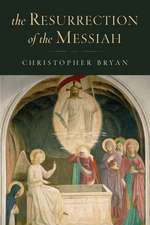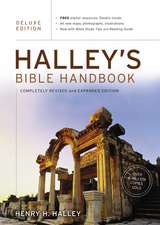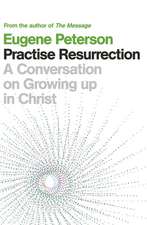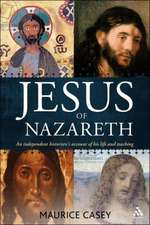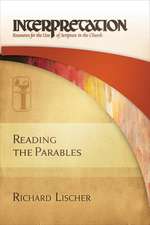T&T Clark Handbook to Social Identity in the New Testament: T&T Clark Handbooks
Editat de Dr. J. Brian Tucker, Dr Coleman A. Bakeren Limba Engleză Paperback – 21 sep 2016
| Toate formatele și edițiile | Preț | Express |
|---|---|---|
| Paperback (1) | 313.44 lei 6-8 săpt. | |
| Bloomsbury Publishing – 21 sep 2016 | 313.44 lei 6-8 săpt. | |
| Hardback (1) | 924.44 lei 6-8 săpt. | |
| Bloomsbury Publishing – 2014 | 924.44 lei 6-8 săpt. |
Din seria T&T Clark Handbooks
- 40%
 Preț: 237.10 lei
Preț: 237.10 lei - 43%
 Preț: 826.07 lei
Preț: 826.07 lei - 27%
 Preț: 345.77 lei
Preț: 345.77 lei - 17%
 Preț: 391.77 lei
Preț: 391.77 lei - 48%
 Preț: 626.47 lei
Preț: 626.47 lei - 47%
 Preț: 202.25 lei
Preț: 202.25 lei - 43%
 Preț: 823.71 lei
Preț: 823.71 lei - 43%
 Preț: 640.21 lei
Preț: 640.21 lei - 43%
 Preț: 727.58 lei
Preț: 727.58 lei - 42%
 Preț: 150.93 lei
Preț: 150.93 lei - 42%
 Preț: 200.36 lei
Preț: 200.36 lei - 45%
 Preț: 144.74 lei
Preț: 144.74 lei - 42%
 Preț: 203.64 lei
Preț: 203.64 lei - 45%
 Preț: 142.25 lei
Preț: 142.25 lei - 41%
 Preț: 209.13 lei
Preț: 209.13 lei - 43%
 Preț: 687.75 lei
Preț: 687.75 lei - 42%
 Preț: 153.55 lei
Preț: 153.55 lei - 41%
 Preț: 209.43 lei
Preț: 209.43 lei - 43%
 Preț: 146.38 lei
Preț: 146.38 lei - 42%
 Preț: 748.57 lei
Preț: 748.57 lei - 43%
 Preț: 146.30 lei
Preț: 146.30 lei - 43%
 Preț: 830.81 lei
Preț: 830.81 lei - 44%
 Preț: 143.64 lei
Preț: 143.64 lei - 41%
 Preț: 219.44 lei
Preț: 219.44 lei - 43%
 Preț: 823.71 lei
Preț: 823.71 lei -
 Preț: 774.83 lei
Preț: 774.83 lei - 42%
 Preț: 204.86 lei
Preț: 204.86 lei - 43%
 Preț: 734.60 lei
Preț: 734.60 lei - 43%
 Preț: 148.93 lei
Preț: 148.93 lei - 43%
 Preț: 641.07 lei
Preț: 641.07 lei - 44%
 Preț: 821.32 lei
Preț: 821.32 lei - 43%
 Preț: 729.87 lei
Preț: 729.87 lei - 43%
 Preț: 692.67 lei
Preț: 692.67 lei - 43%
 Preț: 829.38 lei
Preț: 829.38 lei - 43%
 Preț: 827.00 lei
Preț: 827.00 lei
Preț: 313.44 lei
Preț vechi: 333.21 lei
-6% Nou
Puncte Express: 470
Preț estimativ în valută:
59.98€ • 61.97$ • 49.89£
59.98€ • 61.97$ • 49.89£
Carte tipărită la comandă
Livrare economică 19 martie-02 aprilie
Preluare comenzi: 021 569.72.76
Specificații
ISBN-13: 9780567666499
ISBN-10: 0567666492
Pagini: 680
Dimensiuni: 156 x 234 x 51 mm
Greutate: 1.09 kg
Editura: Bloomsbury Publishing
Colecția T&T Clark
Seria T&T Clark Handbooks
Locul publicării:London, United Kingdom
ISBN-10: 0567666492
Pagini: 680
Dimensiuni: 156 x 234 x 51 mm
Greutate: 1.09 kg
Editura: Bloomsbury Publishing
Colecția T&T Clark
Seria T&T Clark Handbooks
Locul publicării:London, United Kingdom
Caracteristici
Sheds light on the processes of social identity formation among the earliest Christians
Notă biografică
J. Brian Tucker is Associate Professor of New Testament at Moody Theological Seminary, USA, and Honorary Research Fellow at the University of Wales, Trinity Saint David, UK. Coleman A. Baker is Program Manager at the Soul Repair Center, Brite Divinity School, USA, and Adjunct Professor of Religion at Texas Christian University, USA.
Cuprins
Abbreviations Contributors Editors' Preface 1. Introduction - J. Brian Tucker and Coleman A. Baker Part 1: Methodological Studies: 2. An Outline of Social Identity Theory - Philip F. Esler 3. Social History and Social Theory in the Study of Social Identity - Andrew D. Clarke and J. Brian Tucker 4. Ethnicity and Social Identity - Aaron Kuecker 5. Ritual and Social Identity: The Deutero-Pauline Shaping of Early Christianity - Minna Shkul 6. Letter Writing and Social Identity - Matthew J. Marohl 7. A Narrative-Identity Model for Biblical Interpretation: The Role of Memory and Narrative in Social Identity Formation - Coleman A. Baker 8. Nodes of Objective Socialization and Subjective Reflection in Identity: Galatian Identity in an Imperial Context - Robert L. Brawley Part 2: Textual Studies: 9. Group Norms and Prototypes in Matthew 5.3-12: A Social Identity Interpretation of the Matthean Beatitudes - Philip F. Esler 10. Suffering and the Creation of Christian identity in the Gospel of Mark - Paul Middleton 11. Textual Orientations: Jesus, Written Texts, and the Social Construction of Identity in the Gospel of Luke - Rafael Rodríguez 12. Filial Piety and Violence in Luke-Acts and the Aeneid: A Comparative Analysis of Two Trans-ethnic Identities - Aaron Kuecker 13. Social Identities, Subgroups, and John's Gospel: Jesus the Prototype and Pontius Pilate (John 18.28-19.16) - Warren Carter 14. Children of Abraham, the Restoration of Israel and the Eschatological Pilgrimage of the Nations: What Does It Mean For 'In Christ' Identity? - Christopher Zoccali 15. Social Identity and Conflict in Corinth: 1 Corinthians 11.17-34 in Context - Mark Finney 16. 'If Anyone is in Christ, New Creation: The Old has Gone, the New has Come' (2 Cor. 5.17): New Creation and Temporal Comparison in Social Identity Formation in 2 Corinthians - Kar Yong LIM 17. Galatians 2.1-14 as Depiction of the Church's Early Struggle for Community-Identity Construction - Atsuhiro Asano 18. Adopted Siblings in the Household of God: Kinship Lexemes in the Social Identity Construction of Ephesians - Daniel K. Darko 19. Echoes of Paul's Philippians in Polycarp: Texts that Create Identity - Sergio Rosell Nebreda 20. New Identity and Cultural Baggage: Identity and Otherness in Colossians - Minna Shkul 21. Stereotyping and Institutionalization as indications of Leadership Maintenance in the Pastoral Epistles: 1 Timothy as a Test Case - Jack Barentsen 22. Paul's Particular Problem - The Continuation of Existing Identities in Philemon - J. Brian Tucker 23. Social Identity in the Epistle to the Hebrews - Steven Muir 24. Calling on the Diaspora: Nativism and Diaspora Identity in the Letter of James - K. Jason Coker 25. 'Aliens' among 'Pagans', 'Exiles' among 'Gentiles': Authorial Strategy and (Social) Identity in 1 Peter - Todd D. Still and Natalie R. Webb 26. The Agapé Feast in 2 Peter, Imperial Ideology, and Social Identity - R. Alan Streett 27. Identity in First John: Sinless Sinners who Remain in Him - Rikard Roitto 28. Constructing Identity in the Epistle of Jude - Ritva Williams 29. Israelite Ethnic Identity Responding to the Roman Imperium in Revelation - Markus Cromhout Bibliography
Recenzii
.an excellent introduction to SIT and SCT and the usefulness of each for assessing early Christian texts. Biblical scholars, graduate students, and undergraduates can all find material with which to work in this Handbook.
The editors are to be congratulated on bringing together in one volume such a fine collection of essays of uniformly high quality and all of which offer significant insights for the interpretation of the texts with which they deal. [.] The 68 page bibliography is in itself an invaluable asset for scholars researching the area.
This voluminous collection of 29 essays makes a valuable contribution to studies that take the increasingly popular social-scientific approach to New Testament interpretation. While several handbooks on this interpretive approach are available, this is the only collection entirely devoted to the study of social identity in the New Testament ... Summing Up: Highly recommended. Upper-level undergraduates through researchers/faculty.
Every theological library should have this book.
This massive and valuable resource (657 pages), containing essays by an international cast of scholars, focuses on the 'social identity' approach to biblical interpretation. This approach considers how biblical texts both express and foster a group's particular social identity, i.e., the characteristic beliefs, values, and practices that distinguish them from other groups . first inspired by biblical scholar Philip Esler, whose foundational essay on the subject is included at the beginning of the volume.
This highly recommended Handbook offers an introduction to many social scientific theoretical approaches to the New Testament, a relatively new and promising methodological application based upon a relatively new and growing field of observation. Throughout, the Handbook combines methodological explanations with textual examples to offer an accessible introduction to the field for student and scholar alike.
Baker and Tucker have put together a rich collection of essays exploring the meaning and relevance of social identity theory for New Testament studies. All of the essays, which cover nearly every book of the New Testament, brim with helpful insights about the way early Christian authors sought to shape the identities and actions of their audiences. The book deserves to be read and used widely by scholars and advanced students alike.
The application of identity theory to biblical studies is no passing fad, for identity lies at the heart of what the Bible is about. Anyone interested in identity and the Bible will find that this handbook presents both explanations of method in applying identity theory to Scripture and textual studies dealing with most of the New Testament documents. The authors of these helpful essays are some of the most important people currently writing on identity. The editors are to be congratulated for making such a fine handbook available.
The editors are to be congratulated on bringing together in one volume such a fine collection of essays of uniformly high quality and all of which offer significant insights for the interpretation of the texts with which they deal. [.] The 68 page bibliography is in itself an invaluable asset for scholars researching the area.
This voluminous collection of 29 essays makes a valuable contribution to studies that take the increasingly popular social-scientific approach to New Testament interpretation. While several handbooks on this interpretive approach are available, this is the only collection entirely devoted to the study of social identity in the New Testament ... Summing Up: Highly recommended. Upper-level undergraduates through researchers/faculty.
Every theological library should have this book.
This massive and valuable resource (657 pages), containing essays by an international cast of scholars, focuses on the 'social identity' approach to biblical interpretation. This approach considers how biblical texts both express and foster a group's particular social identity, i.e., the characteristic beliefs, values, and practices that distinguish them from other groups . first inspired by biblical scholar Philip Esler, whose foundational essay on the subject is included at the beginning of the volume.
This highly recommended Handbook offers an introduction to many social scientific theoretical approaches to the New Testament, a relatively new and promising methodological application based upon a relatively new and growing field of observation. Throughout, the Handbook combines methodological explanations with textual examples to offer an accessible introduction to the field for student and scholar alike.
Baker and Tucker have put together a rich collection of essays exploring the meaning and relevance of social identity theory for New Testament studies. All of the essays, which cover nearly every book of the New Testament, brim with helpful insights about the way early Christian authors sought to shape the identities and actions of their audiences. The book deserves to be read and used widely by scholars and advanced students alike.
The application of identity theory to biblical studies is no passing fad, for identity lies at the heart of what the Bible is about. Anyone interested in identity and the Bible will find that this handbook presents both explanations of method in applying identity theory to Scripture and textual studies dealing with most of the New Testament documents. The authors of these helpful essays are some of the most important people currently writing on identity. The editors are to be congratulated for making such a fine handbook available.


